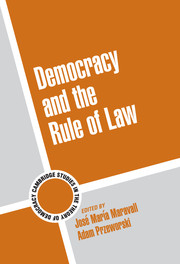Book contents
- Frontmatter
- Contents
- List of Contributors
- Acknowledgments
- Introduction
- Part I
- Part II
- 6 The Majoritarian Reading of the Rule of Law
- 7 How Can the Rule of Law Rule? Cost Imposition through Decentralized Mechanisms
- 8 Dictatorship and the Rule of Law: Rules and Military Power in Pinochet's Chile
- Part III
- Author Index
- Subject Index
6 - The Majoritarian Reading of the Rule of Law
Published online by Cambridge University Press: 09 November 2009
- Frontmatter
- Contents
- List of Contributors
- Acknowledgments
- Introduction
- Part I
- Part II
- 6 The Majoritarian Reading of the Rule of Law
- 7 How Can the Rule of Law Rule? Cost Imposition through Decentralized Mechanisms
- 8 Dictatorship and the Rule of Law: Rules and Military Power in Pinochet's Chile
- Part III
- Author Index
- Subject Index
Summary
In this chapter I challenge one common view of the “rule of law” and, particularly, of what institutional arrangements put the rule of law at risk. According to this perspective, the rule of law is closely connected with (what I call) liberal political systems (which, synthetically, are characterized by a system of checks and balances and entrenched individual rights protected by an independent judiciary). In addition, many among those who defend this view tend to evaluate all moves towards a more majoritarian democracy as threats to the rule of law. Normally, they assume that a majoritarian democracy necessarily results in arbitrary government. This arbitrariness would be the result of basically two features that they associate with the majoritarian democracy: its tendency to produce “hasty” decisions and its inherent incapacity to establish adequate institutional controls, that is, to establish controls over the will of the majority. Majoritarian democracy, thus, is directly associated with an “unchecked majority,” that is, a “populist” regime – in the end, the breakdown of the rule of law.
In what follows, I try to show that it is possible to defend a more majoritarian political system without renouncing, at the same time, the ideal of the rule of law. In this sense, I affirm that there is ample space between the liberal system of government and a “populist” system – enough so to make it possible to defend a reasonable majoritarian system. In the first section of my work, I show how we began to correlate the notion of a majoritarian system with violations of the rule of law.
- Type
- Chapter
- Information
- Democracy and the Rule of Law , pp. 147 - 167Publisher: Cambridge University PressPrint publication year: 2003
- 1
- Cited by

